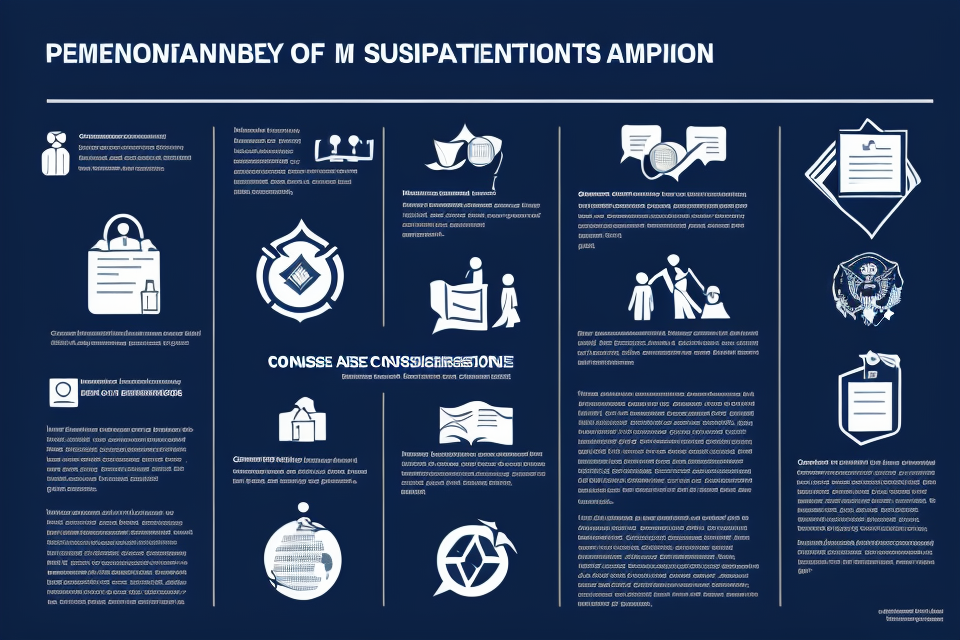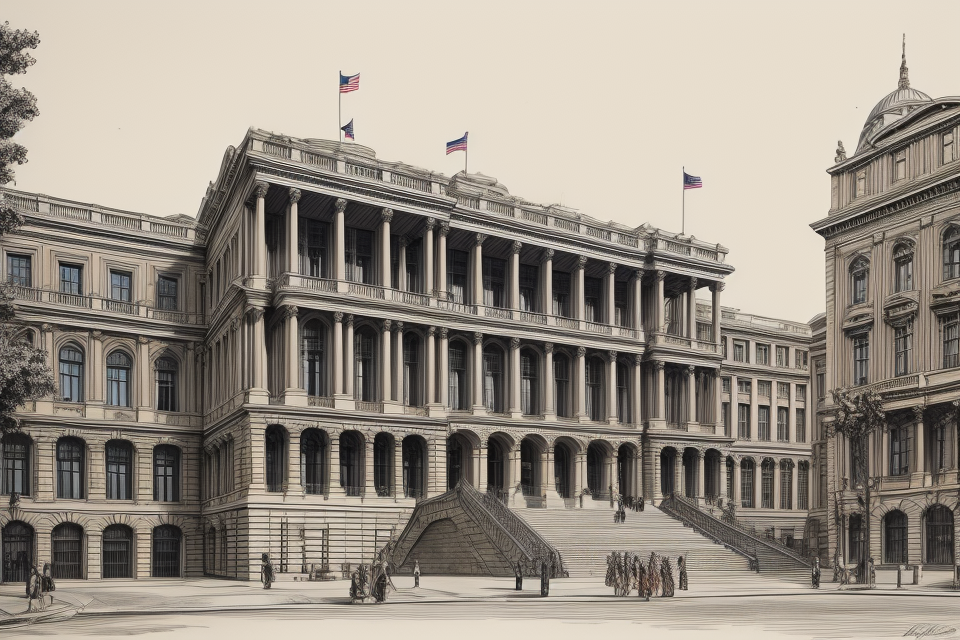Consular services are an essential aspect of international relations, providing assistance and support to citizens of a country while they are abroad. The purpose of consular services is to ensure the welfare and protection of citizens, as well as to promote economic and cultural ties between countries. In this article, we will explore the functions and benefits of consular services, including passport issuance, visa processing, and emergency assistance. Whether you are a frequent traveler or simply curious about the role of consular services in the global community, this article will provide you with a comprehensive understanding of their purpose and significance.
What are Consular Services?
Definition and Overview
Consular services are a crucial component of a country’s foreign policy, designed to promote and protect the interests of its citizens living abroad. These services are provided by the government and include a wide range of diplomatic and administrative functions that aim to assist citizens in various aspects of their lives while they are overseas.
In essence, consular services serve as a bridge between the government and its citizens living abroad, providing them with the necessary support and assistance to ensure their well-being and protect their rights. These services are particularly important for individuals who travel or reside in foreign countries, as they can face various challenges, such as legal issues, medical emergencies, or difficulties with immigration and documentation.
Consular services typically include the following functions:
- Providing assistance in case of emergencies, such as natural disasters, civil unrest, or medical emergencies.
- Issuing and renewing passports, as well as providing other travel-related documents, such as visas and travel permits.
- Offering notarial services, such as certifying documents, administering oaths, and witnessing signatures.
- Providing information and advice on local laws, customs, and regulations, as well as on issues related to immigration, taxation, and social welfare.
- Assisting citizens in resolving legal disputes, including providing legal advice and representation in court.
- Facilitating communication between citizens and their families and friends back home.
Overall, the primary goal of consular services is to ensure the safety, well-being, and rights of citizens living abroad, while also promoting the interests of the country they represent. By providing a range of diplomatic and administrative services, consular services help to strengthen the bond between the government and its citizens, no matter where they may be in the world.
Types of Consular Services
Consular services are a set of activities that are provided by the government of a country to its citizens who are living or traveling abroad. These services are designed to provide assistance and support to citizens in a variety of situations, ranging from emergencies to everyday needs. The types of consular services available can vary depending on the country and the specific needs of its citizens.
Here are some of the most common types of consular services:
Issuing and Renewing Passports
One of the most basic consular services is the issuance and renewal of passports. A passport is a document that is issued by the government of a country to its citizens, which allows them to travel internationally. Consular services are responsible for issuing new passports and renewing expired passports. This service is important for citizens who need to travel internationally for work, study, or other purposes.
Providing Travel Documents
Another common consular service is the provision of travel documents. These documents can include visas, which are required for citizens of some countries to enter certain countries, and travel permits, which are required for citizens to travel to certain areas within their own country. Consular services are responsible for issuing these documents and ensuring that citizens have the necessary documents to travel safely and legally.
Assisting with Legal Issues
Consular services can also assist citizens with legal issues that arise while they are abroad. This can include providing legal advice, helping citizens navigate the legal system of the country they are in, and providing support in cases of arrest or detention.
Facilitating Communication with Family and Friends
Consular services can also help citizens stay in touch with their families and friends back home. This can include providing information on how to make international phone calls or send international mail, as well as helping citizens in emergency situations to contact their loved ones.
Providing Emergency Assistance
Consular services are also responsible for providing emergency assistance to citizens who are in need. This can include providing medical assistance, helping citizens who have been the victim of a crime, and providing support in the event of a natural disaster.
Promoting Trade and Investment Opportunities
Finally, consular services can also promote trade and investment opportunities between the country and other countries. This can include providing information on the business climate and investment opportunities in the country, as well as helping businesses from the country to establish themselves in other countries.
Why are Consular Services Important?
Benefits for Citizens and the Country
Consular services are vital for citizens living abroad as they provide a range of essential support and assistance.
Protection of citizens’ rights and interests
Consular services play a crucial role in protecting the rights and interests of citizens living abroad. They provide assistance in legal and medical emergencies, and they can also help citizens who have been arrested or detained abroad. Additionally, consular services can help citizens who have lost their passports or other important documents while abroad.
Assistance in emergencies
Consular services are often the first point of contact for citizens in emergency situations while abroad. They can provide assistance in situations such as natural disasters, civil unrest, or medical emergencies. They can also help citizens in distress to contact their families and loved ones.
Facilitation of travel and document requirements
Consular services can also assist citizens with the necessary travel and document requirements for their destination country. They can provide information on visa requirements, travel advisories, and other important travel information. They can also assist citizens in obtaining necessary documents, such as passports or birth certificates.
Provision of information and resources
Consular services can provide citizens with important information and resources while abroad. They can provide information on local laws and customs, medical facilities, and other important resources. They can also provide advice on how to stay safe while traveling abroad.
Promotion of economic opportunities
Consular services can also promote economic opportunities for citizens living abroad. They can provide information on job opportunities, business opportunities, and other economic prospects. They can also provide assistance to citizens who are seeking to start a business or invest in a foreign country.
In addition to benefiting citizens, consular services also benefit the country as a whole.
Strengthening diplomatic relations with other countries
Consular services play an important role in strengthening diplomatic relations with other countries. They can facilitate communication and cooperation between the two countries, and they can help to resolve any issues that may arise.
Promoting economic and cultural ties
Consular services can also promote economic and cultural ties between the country and other countries. They can facilitate trade and investment opportunities, and they can promote cultural exchange programs and other initiatives.
Facilitating trade and investment opportunities
Consular services can assist businesses and investors in navigating the legal and regulatory requirements of foreign markets. They can provide information on market conditions, taxation, and other important factors that can impact business operations.
Enhancing the country’s reputation abroad
Consular services can also enhance the country’s reputation abroad by providing high-quality services to citizens and by promoting positive interactions with other countries. They can help to promote a positive image of the country and its citizens, which can have a range of benefits for the country as a whole.
How do Consular Services Operate?
Organization and Administration
Consular services are typically provided by the Ministry of Foreign Affairs or a similar government agency. The organization and administration of these services may vary depending on the country and the specific needs of its citizens abroad. There are several ways in which consular services may operate, including:
- Embassies and consulates: These are official government offices located in foreign countries. They are responsible for providing a range of services to citizens of the sending country, including passport issuance, notarization, and emergency assistance.
- Honorary consuls: These are individuals who are appointed by the sending country to provide consular services in a foreign country. They are not government employees and are usually local residents. Honorary consuls may provide services such as passport issuance, emergency assistance, and notarization.
- Diplomatic missions: These are official government offices located in the sending country. They are responsible for providing services to citizens of the receiving country, including passport issuance, notarization, and emergency assistance.
- Online platforms and digital services: Some countries offer online consular services, such as passport renewal and document legalization. These services may be provided through the official government website or through a dedicated app.
The specific organization and administration of consular services may vary depending on the country and the needs of its citizens abroad. Some countries may have a centralized system with a small number of embassies and consulates, while others may have a decentralized system with many honorary consuls. Additionally, some countries may have agreements with other countries to provide consular services on their behalf.
Who is Eligible for Consular Services?
Citizenship and Residency Requirements
Eligibility for consular services is primarily determined by citizenship and residency requirements. Typically, citizens of a country are eligible for consular services while they are abroad.
However, it is important to note that the specific requirements may vary depending on the country and the type of consular service required. For instance, some countries may have specific residency requirements before their citizens are eligible for certain consular services.
Additionally, in some cases, certain services may also be available to non-citizens, such as emergency assistance or information about local laws and regulations. However, this is subject to the discretion of the consular officer and the specific circumstances of the individual.
It is recommended that individuals seeking consular services familiarize themselves with the specific requirements and regulations of the country they are in, as well as their own country’s consular services. This can help ensure that they are able to access the services they need in a timely and efficient manner.
Documentation and Application Process
When it comes to accessing consular services, it is important to understand the documentation and application process that is typically required. The specific requirements and procedures may vary depending on the country and the type of service required, but generally, the following steps are involved:
- Valid Passport: One of the most important documents required to access consular services is a valid passport. It is important to ensure that your passport is up-to-date and will be valid for at least six months beyond your planned stay in the country where you are seeking consular services.
- Completed Application Form: Consular services require the completion of an application form, which can be obtained from the embassy or consulate of the country where you are seeking services. It is important to provide accurate and complete information on the application form, as any errors or omissions may result in delays or denial of services.
- Supporting Documents: Depending on the type of consular service required, additional supporting documents may be required. For example, if you are applying for a visa, you may need to provide proof of financial support, proof of accommodation, or proof of employment.
- Biometric Data: As part of the application process, you may need to provide biometric data, such as fingerprints or a photograph, to be used for identification purposes.
- Application Submission: Once you have completed the application form and gathered all necessary supporting documents, you will need to submit your application to the embassy or consulate of the country where you are seeking services. It is important to follow the instructions provided by the embassy or consulate regarding the submission process, as failure to do so may result in delays or denial of services.
It is important to note that the documentation and application process for consular services can be complex and time-consuming. It is recommended that you start the process well in advance of your planned travel or event to ensure that you have enough time to gather all necessary documents and complete the application process.
Challenges and Limitations of Consular Services
Resource Constraints and Security Considerations
Resource constraints and security considerations are two of the primary challenges facing consular services. These constraints can impact the ability of consular officials to provide assistance to citizens living abroad.
- Budget limitations: Consular services are often subject to budget constraints, which can limit the resources available for providing assistance to citizens. This can make it difficult for consular officials to provide the necessary support for citizens in need.
- Staffing limitations: Consular services may also be limited by staffing constraints. This can make it difficult for consular officials to provide timely assistance to citizens, particularly in areas with high levels of demand.
- Security considerations: Security considerations are a critical factor in the provision of consular services. Consular officials must balance the need to provide assistance to citizens with the need to protect citizens and government personnel. This can make it difficult to provide certain services, particularly in areas with high levels of political or social unrest.
- Limited jurisdiction: Consular officials may not have the authority to intervene in certain legal matters. This can limit their ability to provide assistance to citizens in legal disputes or other matters.
- Cultural and language barriers: Cultural and language barriers can make it difficult for citizens to access consular services or understand their rights. This can make it challenging for consular officials to provide effective assistance to citizens.
Despite these challenges, consular services remain an important resource for citizens living abroad and an essential component of a country’s diplomatic and administrative efforts.
FAQs
1. What is the purpose of consular services?
Consular services are provided by a country’s government to its citizens who are living or traveling abroad. The purpose of consular services is to assist and protect the interests of citizens in foreign countries, as well as to promote economic and cultural ties between the home country and the host country. Consular services also play a role in maintaining diplomatic relations between countries.
2. What are some of the functions of consular services?
Consular services perform a variety of functions, including providing assistance to citizens in distress, helping citizens with legal issues, providing advice on immigration and visa matters, offering notarial services, and facilitating trade and investment between the home and host countries. Consular officials may also work to promote the interests of their country and its citizens, and to maintain good relations with the host country’s government.
3. How can I access consular services?
If you are a citizen of a country and you need consular assistance while abroad, you can contact the nearest embassy or consulate of your home country. You can usually find the contact information for your country’s embassy or consulate on the government’s website or through a directory of foreign embassies. It is also a good idea to register with the embassy or consulate when you arrive in a foreign country, so that they can contact you in case of an emergency.
4. What types of assistance can I expect from consular services?
Consular services can provide a wide range of assistance to citizens in distress, depending on the situation. Some common types of assistance include helping citizens who have been arrested or detained, providing emergency financial assistance, assisting with the repatriation of remains, and helping citizens who have been the victim of a crime. Consular officials may also be able to provide advice and assistance with legal issues, immigration matters, and other issues that may arise while abroad.
5. What are some of the benefits of consular services?
The benefits of consular services are numerous. Consular officials can provide assistance and support to citizens in distress, which can be a great comfort to those who are far from home. Consular services can also help citizens navigate the legal and immigration systems of foreign countries, which can be complex and difficult to understand. In addition, consular services can help facilitate trade and investment between countries, which can benefit both the home and host countries. Finally, consular services play an important role in maintaining diplomatic relations between countries, which can help to promote peace and stability around the world.



